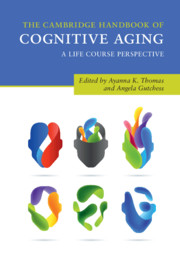Book contents
- The Cambridge Handbook of Cognitive Aging
- The Cambridge Handbook of Cognitive Aging
- Copyright page
- Contents
- Figures
- Tables
- Contributors
- Introduction
- Part I Models of Cognitive Aging
- Part II Mechanisms of Cognitive Aging
- Part III Aging in a Socioemotional Context
- Part IV Cognitive, Social, and Biological Factors across the Lifespan
- Part V Later Life and Interventions
- 32 Cerebrovascular Disease, Aging, and Depression: Clinical Features, Pathophysiology, and Treatment
- 33 The Role of Nutrition in Cognitive Decline
- 34 The Role of Sleep in Cognitive Aging
- 35 The Relationship between Accelerometer-Derived Metrics of Physical Activity and Cognition among Older Adults
- 36 Far Transfer and Cognitive Training: Examination of Two Hypotheses on Mechanisms
- 37 Maximizing the Impact of Cognitive Engagement Interventions for Older Adults
- 38 Mobility and Cognitive Decline in Older Adults with Cognitive Impairment
- 39 Current and Emerging Technologies for Supporting Successful Aging
- Part V Summary: Later Life and Interventions
- Index
- Plate Section (PDF Only)
- References
37 - Maximizing the Impact of Cognitive Engagement Interventions for Older Adults
from Part V - Later Life and Interventions
Published online by Cambridge University Press: 28 May 2020
- The Cambridge Handbook of Cognitive Aging
- The Cambridge Handbook of Cognitive Aging
- Copyright page
- Contents
- Figures
- Tables
- Contributors
- Introduction
- Part I Models of Cognitive Aging
- Part II Mechanisms of Cognitive Aging
- Part III Aging in a Socioemotional Context
- Part IV Cognitive, Social, and Biological Factors across the Lifespan
- Part V Later Life and Interventions
- 32 Cerebrovascular Disease, Aging, and Depression: Clinical Features, Pathophysiology, and Treatment
- 33 The Role of Nutrition in Cognitive Decline
- 34 The Role of Sleep in Cognitive Aging
- 35 The Relationship between Accelerometer-Derived Metrics of Physical Activity and Cognition among Older Adults
- 36 Far Transfer and Cognitive Training: Examination of Two Hypotheses on Mechanisms
- 37 Maximizing the Impact of Cognitive Engagement Interventions for Older Adults
- 38 Mobility and Cognitive Decline in Older Adults with Cognitive Impairment
- 39 Current and Emerging Technologies for Supporting Successful Aging
- Part V Summary: Later Life and Interventions
- Index
- Plate Section (PDF Only)
- References
Summary
In the past few decades, there has been a surge of research on cognitive interventions to increase cognitive abilities in older adults, many of whom experience age-related cognitive and functional declines. It has become increasingly clear that although cognitive interventions with older adults can increase cognitive abilities that are directly targeted in the training program, increasing untrained cognitive abilities and abilities related to daily life activities has not been as effective as originally anticipated. Instead of taking a pessimistic view that it is impossible to substantially increase cognitive and functional abilities across a variety of domains in older adults, we propose that cognitive interventions could benefit from developing theory-driven research programs, especially by incorporating findings from earlier in the life span and models of behavior change, to optimize intervention gains in later adulthood. Moreover, intervention gains can also be increased by taking into consideration participant characteristics, situations, and preferences when designing interventions. Instead of considering these factors as “noise,” they provide meaningful information about differences in individual experiences in the past, present, and future. This chapter focuses mostly on cognitive engagement interventions, which are holistic interventions employing real-world skills and tasks. After briefly reviewing the current state of the literature, we discuss ways in which researchers have begun to investigate how to maximize the impact of engagement interventions on cognitive abilities and functional independence (i.e., the ability to perform daily activities independently). In addition, we consider unique cognitive, social, and environmental aspects of the older adult that can be leveraged for maximizing the impact of cognitive engagement interventions.
Keywords
- Type
- Chapter
- Information
- The Cambridge Handbook of Cognitive AgingA Life Course Perspective, pp. 685 - 700Publisher: Cambridge University PressPrint publication year: 2020
References
- 1
- Cited by

